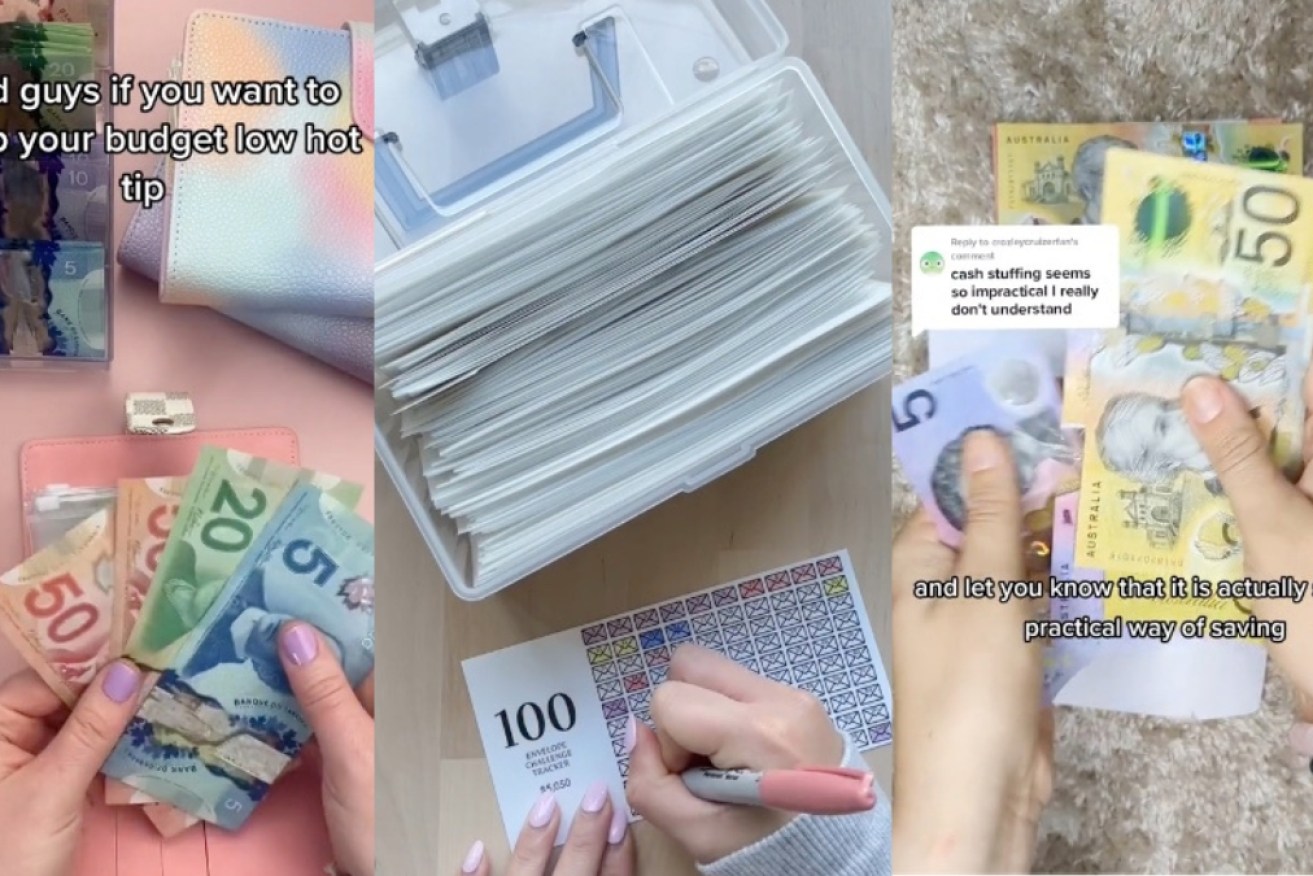TikTok trends using cash to save money


Cash might no longer be king, but it could help you save. Photo: TND/TikTok/@cdngirlcashstuffer/@modernbudgeter/@getstuffedau
Cash might now be a rare sight in people’s day-to-day lives, but TikTokers are putting the spotlight back on banknotes and coins as they spruik the latest savings trends.
In particular, TikToks where users show off the results of ‘cash stuffing’ or their progress in the ‘100-envelope challenge’ have racked up millions of views as people look for more ways to save money amid global cost-of-living pressures.
The trends are proving popular with people who otherwise have trouble saving money, with their bank accounts constantly at their fingertips thanks to mobile and card payments.
But experts warn that if you’re looking to save, you should tailor any plan to your individual circumstances.
What are the savings trends?
Cash stuffing involves putting varying amounts of cash aside for your expenses during a set period, typically in a wallet or folder with several labelled sleeves.
It’s basically a form of budgeting; for example, you might decide on specific amounts of money for a week’s worth of expenses – such as groceries, petrol and dining out – and try not to spend any more cash than you’ve set aside in the designated sleeves.
The 100-envelope challenge involves taking 100 envelopes, labelling them one to 100, and then regularly filling an envelope with the corresponding amount of money; this means envelope No.42 would be filled with $42.
Once all of the envelopes have been filled, you will have saved about $5000.
Some TikTokers are combining the two trends by using any money left over from cash stuffing being put towards the 100-envelope challenge.
Alternative to frictionless spending
With their bank accounts at their fingertips, it can be hard to develop enough self-control to stick to your budget and avoid impulse-purchases.
Andrew Grant, University of Sydney associate professor of finance, advised storing extra money in a savings account, and some banking institutions allow you to set up multiple accounts for designated expenses, much like cash stuffing.
But he said having cash physically on hand could help add a bit of friction to the otherwise seamless process of paying for items and services, which could encourage people to think twice before spending.
“If you’re not good at saving money conventionally, perhaps making it a little bit more challenging … might actually help you develop some good habits,” he said.
“Some old-style habits might actually help you keep [on] track and realise how much money you are spending on things, or how much additionally you could be saving.”
Tailor trends to your needs
The popularity of these savings trends on social media highlights the severity of the current cost-of-living crisis, said Angel Zhong, RMIT University associate professor of finance.
She said inflationary pressures are also behind the similar popularity of ‘finfluencers’, who have increasingly come under the scrutiny of authorities like the Australian Securities and Investments Commission for providing unlicensed financial advice.
Just like when listening to advice from finfluencers, Dr Zhong said social media users should think twice before following savings trends to the letter.
When it comes to finances, one size does not fit all.
Source: TND/TikTok/@mooch.app/@msmillenialsnmoney
“It’s really important to recognise the fact that individuals just have different financial situations,” Dr Zhong said.
“What suits someone else may not necessarily suit you, so that is the limitation of … money challenges.”
For example, while the end goal of the 100-envelope challenge is to save $5000, if you earn just $20,000 per year, saving the former amount may not be feasible.
Dr Zhong said the golden rule to improving your financial wellbeing and achieve long-term sustainability is to make a budget, and regularly review it.
“If you want to empower yourself financially, and you want to attain financial freedom in the long run, it is essential to make a budget – then you can find out how much you can afford to save and invest,” she said.
“You need to just comprehensively assess the value of your assets, the value of your debt and your income, your spending. Do you have any goals? For example, are you saving up for a house? Do you want to buy a car?
“Work out your situation, make a budget from a long-term perspective, [and] then you can act accordingly.”

















